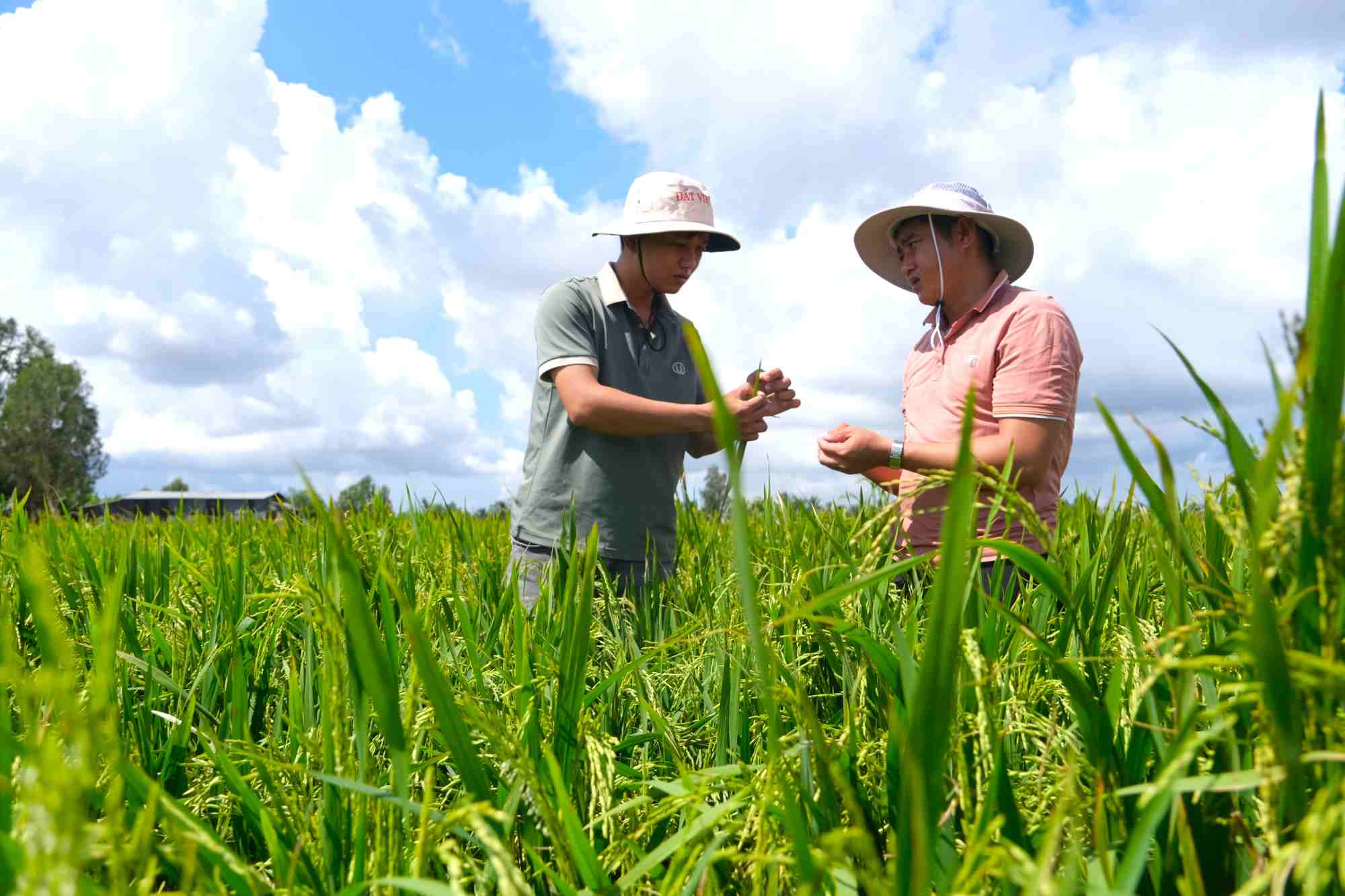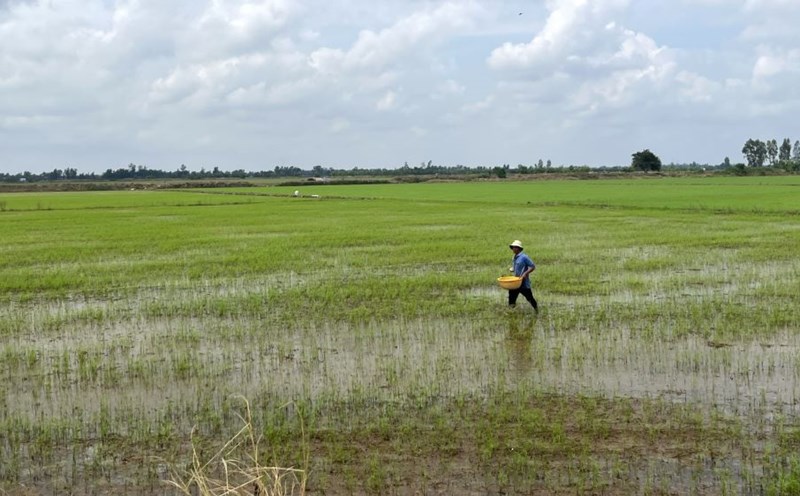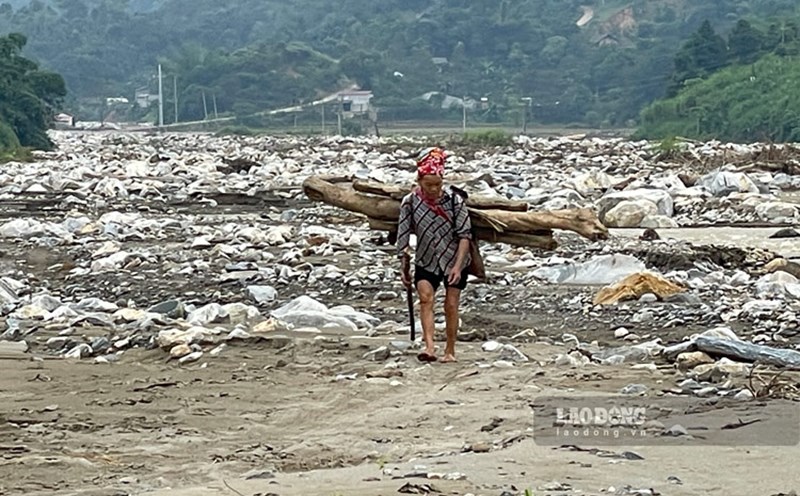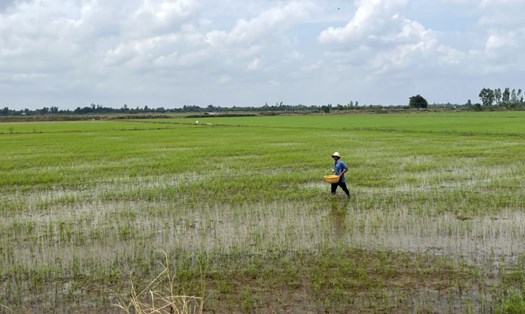"We have sprayed all kinds of pesticides but it still doesn't work, now the rice is 5-7 parts empty" - Lao Dong Newspaper received the above information from many farmers and agricultural officials when stink bugs attacked the third crop (Autumn-Winter) in the Long Xuyen Quadrangle.
Lang Com farmers face the risk of "losing their rice pot"
Following Mr. Nguyen Van Hung - Vice President of the Lang Com Hamlet Farmers' Association (Binh Giang Commune - Hon Dat) to visit Lang Com field, we easily realized the terrible consequences caused by stink bugs when we just set foot on the first field.
True to its name, in the middle of the field, storks fly straight, the wind is strong but cannot erase the characteristic stench. The rice plants are past the milky stage but the rice clusters still point straight up to the sky, the rice grains only have the husks left, all the starch inside has been drained by stink bugs.
"Preliminary calculations show that at least 200 hectares of rice have been affected to varying degrees," Mr. Hung shared.
Many farmers have a very vague understanding and have not been instructed by the authorities on growth and damage processes, leading to the mentality of selling rice earlier than the cycle.
"This time of unusual rain and wind, and the pressure to pay investment costs... has put us farmers in a situation where we have no choice but to sell rice at any price" - Mr. Huynh Van Co - a farmer in Lang Com hamlet sadly said. It is known that stink bugs have also spread to many localities in the Mekong Delta such as Soc Trang, Tra Vinh...

Headache with harmful insects
“Initially, I sprayed pesticides every 3 days, but after a few times, I saw that the number of stink bugs in the rice fields had not decreased, so I shortened the spraying time to every 2 days,” said Mr. Huynh Van Co (Lang Com hamlet, Binh Giang commune, Hon Dat district, Kien Giang province). We were even more shocked when he informed us that he had mixed many types of chemicals into one sprayer. At first, he used 2-3 types, but after a few times, he did not see the desired results, so he increased the number to 4-5 types/sprayer.
Many old farmers admit that to treat rice diseases, farmers have turned to asking for support from pesticide dealers or teams spraying pesticides using drones.
Speaking to Lao Dong, Master Nguyen Phuoc Tuyen - former Director of the Agricultural Extension Center of Dong Thap province - said that normally, agents and drone spraying teams have the advantage of regularly updating information, so they have more understanding of agricultural chemicals than most farmers. "Currently, there is no specific medicine, so the more spraying chemicals are used, the more farmers waste money unnecessarily" - Mr. Tuyen expressed.
Timely solutions needed to protect the quality of Vietnamese rice brand
“Pointing to the rice with many stained grains in Mr. Co’s rice field, Mr. Tran Minh Hieu, an agricultural technician in crop and biological fertilizers, shared: “This is the most easily recognizable sign of rice grains poisoned by pesticides.” According to Mr. Hieu, this image is quite common in many fields in the Mekong Delta.
Master Nguyen Phuoc Tuyen expressed his concern: The intensive and busy spraying of many types of chemicals at the time of harvest without paying full attention to the chemical composition will likely cause the chemicals to suppress and cancel each other out. Continuous spraying at the time of harvest will not give enough time for the rice plant to release pesticide toxins through biological mechanisms. In other words, it increases the possibility of pesticide residues remaining in rice grains. This not only directly "poisons" the health and lives of consumers, but through emissions into the air, water, etc., it also affects the health of people who do not directly eat this rice.
"In the current progressive trend, rice importing countries are constantly increasing technical barriers to protect the health of local consumers," Mr. Tuyen emphasized and said: "If there are no timely and thorough measures to improve, today's treatment of small insects will ignite a fire in the quality, reputation, and brand of Vietnamese rice."
Many agricultural experts warn that the current heavy spraying of pesticides will directly attack and destroy beneficial insects for rice plants. In other words, it will deprive the plant of an important support that helps it increase its resistance before harmful insects attack.
Risk of attack on golden rice crop
Master Nguyen Phuoc Tuyen - former Director of the Dong Thap Provincial Agricultural Extension Center - said that the Mekong Delta is growing rice in alternating seasons. This will increase the environment for stink bugs to stay and multiply to attack on a larger scale on the 2024-2025 Winter-Spring rice crop. More seriously, there is still no specific medicine to treat stink bugs. All of these shortcomings will resonate into a great risk that threatens the position of Vietnamese rice in the world market. Because Winter-Spring is the rice crop with the highest yield and quality of the year, specializing in serving the export market.











